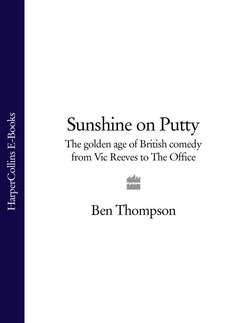Читать книгу Sunshine on Putty: The Golden Age of British Comedy from Vic Reeves to The Office - Ben Thompson, Ben Thompson - Страница 48
4. The British Comedy Awards
Оглавление‘I’ve been round the back, fisting Norman Lamont’
Julian Clary, British Comedy Awards, 1993
Most of the ever-proliferating number of showbiz prize-giving ceremonies prefer to stay as far away as possible from the essence of the art form they are supposed to be celebrating. But the British Comedy Awards – in its heady blend of acerbic wit, rampant egotism and breath-taking cruelty – is just about as complete a reflection of the world it was created to celebrate as can be contained in a small box in the corner of your living-room.86 And all this at the behest of London Weekend Television, a station renowned – in recent years at least – for its almost complete inability to produce anything like a functional TV comedy programme.
So how did this unlikely paragon of verisimilitude come about?
‘The first year [1990],’ remembers host Jonathan Ross, ‘Michael Parkinson presented the show from the London Palladium, and it died on its arse. The next year…’ he continues, gulping modestly, ‘I guess I needed the money.’
It should be remembered at this point that the Jonathan Ross of the early nineties was a long way from the all-conquering career behemoth of the early years of the twenty-first century. In fact, as things went increasingly awry for him, the Comedy Awards would gradually end up as the only time in the year when – with a little help from its hugely influential scriptwriter Danny Baker87 – you could see Ross on TV at his best.
‘ITV were a little nervous about it,’ he remembers of the show in the first year he took it over, ‘and if you looked at what they did the year before, you could see why. Danny Baker had written this script and it was really verbose but also really bold. I stuck my neck out and insisted we use it, and it sort of snowballed from there. Whenever anyone complains about getting a hard time, we just say “It’s the spirit of the roast” [the roast being an American tradition where everyone gets slagged off and has to pretend they don’t mind] and coming out into that kind of atmosphere seems to help everyone rise to their best potential.’
Why does he think it works so well?
‘It’s quite an interesting thing to do to comedians – to have them coming out for a minute and a half, not knowing what I’m going to be saying to them. They’re kind of a bit on edge and they all want to make an impression, so inevitably they end up pushing things a bit further.’
Sometimes, as in the semi-legendary 1993 case of Julian Clary, they go a little too far. (Clary’s famously outrageous response to Ross’s innocent enquiry as to what he had been up to was that he had been ‘out the back, fisting [fellow awards presenter and former Chancellor of the Exchequer] Norman Lamont’.) While Clary’s coup de theatre earned him the undying respect of 99 per cent of those watching, it certainly didn’t do his chances of filling Bruce Forsyth’s shoes as host of a revitalized Generation Game any favours.
‘But with some people,’ Ross insists (Ricky Gervais and Johnny Vegas in 2001 would presumably be prime examples), ‘you could identify their appearance at the Comedy Awards as the moment where they stepped forward to claim a wider audience.’ Whether or not it’s true that, as Ross contends, ‘you can basically predict how someone’s year’s going to go from the kind of impression they make in that minute and a half, there is no denying that the British Comedy Awards offer the ambitious comedian a stage unlike any other.
From the risky but ultimately triumphant (Gervais making comic capital out of his producer’s wheelchair, or Spike Milligan calling the heir to the throne a ‘little grovelling bastard’ while accepting a lifetime achievement award) to the just plain disastrous (Jerry Springer trying to make a move on Rachel Weisz without knowing that she was someone he was meant to have heard of springs to mind at this point),88 there is an authentic sense of spontaneous high drama about the British Comedy Awards’ most memorable moments. And that is something the Oscars – never mind the BAFTAs – would do well to emulate.
